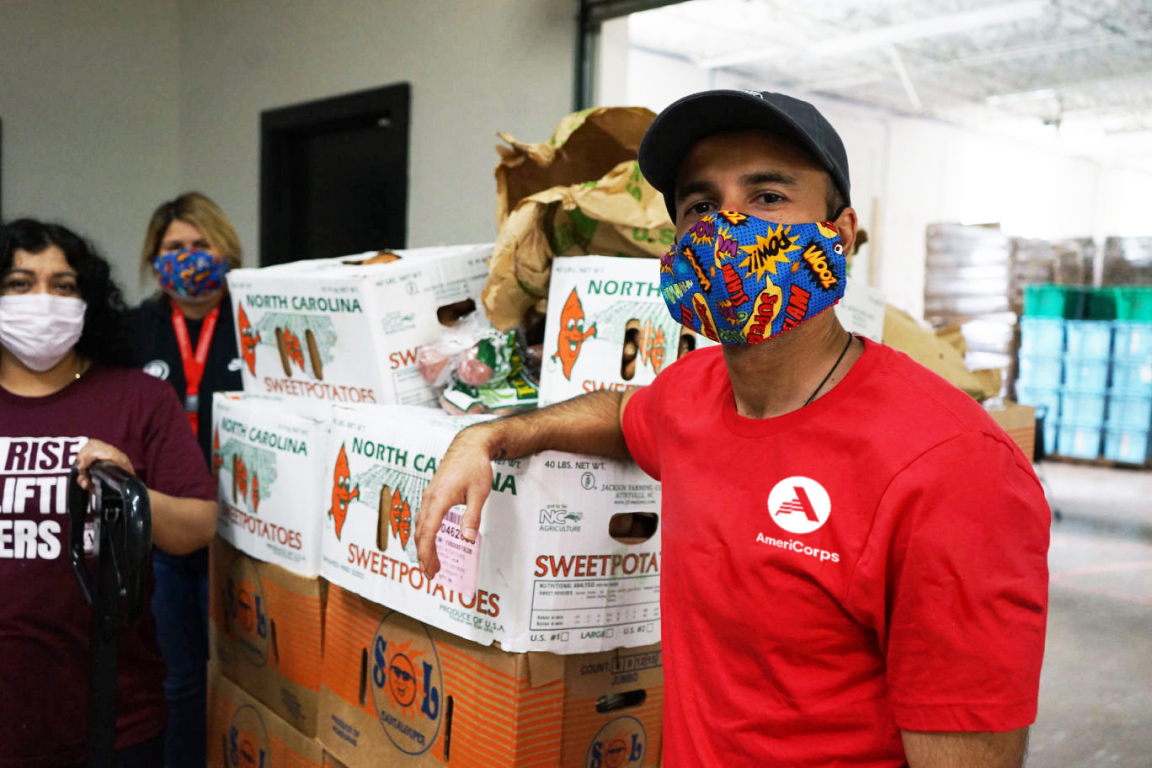AmeriCorps Responds to COVID-19
AmeriCorps members and AmeriCorps Seniors (ages 55+) volunteers have helped communities tackle the nation’s most pressing challenges for nearly three decades, and their service has never been more crucial than during the COVID-19 pandemic. AmeriCorps’ ability to send resources and people where they are most needed is especially valuable in helping our hardest hit communities respond to and recover from COVID-19.
Working with 2,000 nonprofits, faith-based and neighborhood organizations, federal agencies, and state and local governments, and national organizations, including the American Red Cross, FEMA, Habitat for Humanity, SBP, and United Way, AmeriCorps members and AmeriCorps Seniors volunteers are supporting contact tracing and vaccination efforts, collecting and distributing food, tutoring students, conducting wellness checks for homebound individuals, and more.
End of Public Health Emergency and Program Flexibilities
Addendum to End of Public Health Emergency and Program Flexibilities
AmeriCorps COVID-19 Fact Sheet
Vaccination Support
AmeriCorps members and AmeriCorps Seniors volunteers assist at vaccination sites and mobile clinics in underserved communities. They make site operations more efficient, help lines move faster, get people off waiting lists, assist with vaccination registration, coordinate transportation, and provide comfort to vulnerable community members. Since vaccinations began, AmeriCorps members have assisted more than 1 million people.
AmeriCorps’ Disaster Response Teams, NCCC program members, and FEMA Corps members are crucial to vaccination efforts. Since vaccination efforts began, AmeriCorps members have assisted more than 1 million people at more than 100 vaccination sites. They have registered 20,000 people for vaccination appointments and signed up an additional 60,000 volunteers to help support vaccination efforts in California, Florida, Missouri, New Jersey, New York, Texas, and West Virginia.

Food Security
AmeriCorps members and AmeriCorps Seniors volunteers help food banks and pantries meet higher demands by organizing volunteers, packing meal kits, participating in food distribution events, and delivering food to homes. They deliver meals and groceries to vulnerable seniors through programs such as Meals on Wheels, support students through school food distribution sites and food delivery, and care for community gardens that provide fresh, healthy produce to food banks.
Education
Education has been significantly disrupted by the COVID-19 pandemic. Throughout the last year, AmeriCorps members and AmeriCorps Seniors volunteers have continued to support students in remote and in-person environments in flexible and creative ways. They will continue to address students’ social, emotional, and academic development, providing crucial assistance to teachers, administrators, and school communities.
Program Highlights
COVID-19 Relief in Colorado
The COVID-19 Containment Response Corps in Colorado is an AmeriCorps program created in partnership between Governor Polis, Colorado Department of Public Health and Environment, Serve Colorado, Gary Community Investments, Community Resource Center, Conservation Legacy, Cultivate, and Volunteers of America Colorado. AmeriCorps members and AmeriCorps Seniors volunteers serving through the COVID-19 Containment Response Corps completed more than 17,000 case investigations, 7,000 contact traces and delivered more than 32,000 test results to Colorado residents.
Read more about the contributions of the COVID-19 Containment Response Corps
Food Security in Four States
AmeriCorps VISTA members are part of a four-state initiative to create a comprehensive and collaborative approach to address food insecurity. Members organize community coalitions, break down silos between service providers, develop tools to help local leaders better target services, apply for grants, and cultivate new relationships with private sector partners to support food banks. They also recruit and train additional volunteers to help with food delivery programs and conduct outreach to help increase awareness of and enrollment in support programs, such as SNAP.
Student Support in Alabama
In Butler County, Alabama, AmeriCorps Instructional Support Team provide early intervention and academic assistance in all pre-schools, elementary, middle school and high schools. When schools closed in March 2020, only essential administrative staff and AmeriCorps members were allowed at school sites to pack and deliver meals to more than 2,400 students in the rural county and prepared materials and classes for the re-opening of school. Members help students catch up through one-to-one and small group instruction and made take-home activity packets for remote pre-school learners.
Additional Resources
Partner Resources
- COVID-19 Community Corps (HHS)
- Contact Tracing Training & Resources (CDC)
- FAQ & Guide to Supporting Vaccine Confidence for Faith and Community Leaders (HHS)
- Civil Rights Considerations During COVID-19 Vaccine Distribution Effort – Checklist (FEMA)
- COVID-19 vaccines at VA (US Department of Veteran Affairs)
